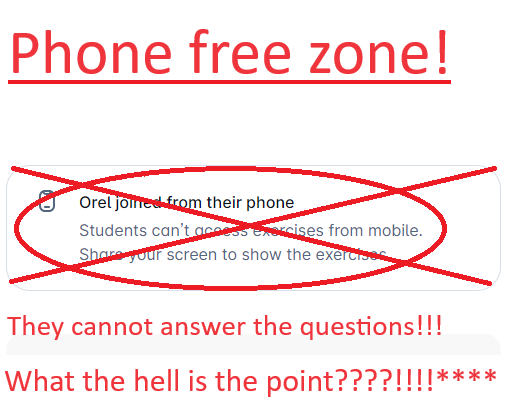
|
Central Data Service |
||
|
SMARTPHONE POLICY | ||
|
Email : [email protected] (44) (0) 7943055280 |
||


Myth: Yes. You can study and attend online classes on smartphones.
Fact: For any smartphone, you get a small screen, and an even smaller smaller keyboard. Seriously now, a laptop or a PC is the tool for the job, because they have a big screen, good keyboard, etc. You can actually see what is going on! You can read notes during a lesson. You can take part in activities. And you can type during a lesson. Try that on a phone!!! Would you type up a long business report on your phone?
Myth: But the only problem with a pc or laptop is that they are expensive.
Fact: If you own an Apple device your budget cannot be that low! If you can afford an Iphone, a laptop is considerably cheaper!
Myth: Moble browsers are just as capable nowadays.
Fact: all of the online teaching platfoms implement many features using proprietry code which is not supported on mobile browsers, and even if it were, the text is so small it will not be viewable on such a small display. It would be a help if site designers kept to internet standards.
Myth: But if you want a bigger screen with a cheap price, you should probably buy a tablet such as iPad pro, Microsoft surface Pro 7, etc. The tablets also support keyboards which are ideal to write assignments.
Fact: Most of the tablet browsers and Ipad browsers are in fact cut down versions of full featured browsers. More advanced functions of teaching sites are crippled on these devices. You are paying for something you cannot use!
Conclusion: The best lesson I can deliver on a tiny smartphone or tablet 0 is the perfect technique for giving yourself eyestrain - as you squint holding the phone centimetres from your face trying to read the text, and perhaps the best methodology for developing a migraine. And - you are much more likely to use a desktop or laaptop in a noise and distraction free environment conducive to learning.
Mobile devices are great for managing your schedule and keeping in contact with students on the move - but lesson delivery devices they definitely are not. Would you spend a lot of your �'s, $'s or �'s going to the cinema to watch a full length film on a tiny display suspended a few centimetres in front of your face - forcing you to strain your eyes just to see what is happening? Come on � Get the learning experience you are paying for!!!
Most online course tools, including cloud based authoring and conventional desktop authoring and learning management systems support mobile devices in only the most rudimentry fashion. As an end user, you're generally limited to what your course provider and their tools can deliver, but most organisations are building for mobile these days - but with SEVERE LIMITATIONS. For developers, or if you're curious what the limitations driving mobile support are, it's more complex. HTML5 support for anything but fairly simple content is unreliable on any platform in my experience. I've seen issues with HTML5 content exported from all of the major desktop authoring tools, including Storyline 2, Adobe Presenter and Captivate. Another issue is that many iPads.tablets and iPhones, which are lingering inconveniently, have small if not tiny, 4x3 aspect ratio screens, as opposed to the 16:9 ratios on most newer devices and desktops. This isn't an issue for rudimentary content that can be built responsive, but when you're building complex interactivity and simulations, it can cramp developers' style and lowers the complexity and resolution of content other users can experience to accommodate these older devices. In these situations, for some content, organisations may decide to not support neither old nor tiny screens.